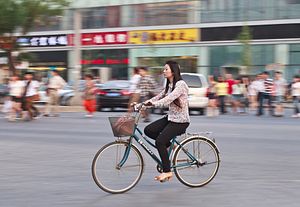On December 10 we celebrate Human Rights Day, commemorating the 67th anniversary of the United Nation’s Universal Declaration of Human Rights. And according to Louise Arbour, former UN High Commissioner for Human Rights, “poverty prevails as the gravest human rights challenge in the world.”
If you subscribe to Christopher Hitchens’ point of view, “there is only one cure for world poverty that’s ever been found or ever will be and it’s very simple … it’s called the empowerment of women.”
Yet in March Chinese authorities arrested a group of young female activists known as the Feminist Five who had been handing out fliers on buses and subways in order to raise awareness about sexual harassment.
In September President Xi Jinping spoke before the UN where he reaffirmed China’s commitment to women’s rights, pledging $10 million to UN Women, however President Barack Obama was not in attendance and presidential candidate Hillary Clinton tweeted: “Xi hosting a meeting on women’s rights at the UN while persecuting feminists? Shameless.”
Then last week Beijing shut down an art exhibition on violence against women. One report stated, “China’s nascent feminist movement has been on the receiving end of a Communist party crackdown.”
Are Xi’s promises therefore meaningless? Is the government simply humming the tune of women’s rights while flagrantly contravening them? Not precisely, no.
For one thing, there are positive steps forward happening as well. A landmark domestic violence law has now been twice recast by the drafting committee and is being formally considered; it’s likely to pass early next year.
Furthermore, I spoke with Julia Broussard this week, program manager for UN Women China, who believes that “the government is genuine in its overall desire to support gender equality.”
Why then does the government continue to throw feminists in jail and shut down art exhibitions? Broussard says, “It’s well known that the government here in China has a very low tolerance for any form of public protest.”
That is to say, the Chinese government isn’t opposed to feminism. It’s opposed to activism. That’s why the Feminist Five were arrested. As for why the recent art exhibition was shut down, Broussard said it’s unlikely to be related to feminism since a similar exhibition, the End Violence Against Women (EVAW) Day art exhibit, which ran from November 24 to December 4, had “no problems whatsoever.”
Moreover, Crossroads Center Beijing, a cultural non-government organization that worked with the UN to organize the EVAW day event, also hosted this year’s 3rd China Women’s Film Festival. There were no incidents with that event either.
The main problem facing women’s rights in China isn’t the government’s opposition to activism. It’s corruption and all the attendant obstacles this presents. Take the domestic violence law, for example. Its passage is of course pivotal, but that’s only the first step toward change.
“Assuming the law does pass,” Broussard notes, “then we need to work with our Chinese counterparts both in the government and in civil society to make sure that the law is enforced.”
This includes collaboration with police, judiciary, civil affairs, procuratorate, the All-China Women’s Federation (ACWF), and the health sector in order to make sure domestic violence legislation is enforced, violations are reported and victims receive proper treatment.
It’s a difficult road ahead but the wheels of progress are already in motion. Nevertheless, success isn’t guaranteed. One major speed bump involves societal attitudes within China. For instance, according to a 2013 UN study, the main reason cited by Chinese men who commit rape was a belief that “they have a right to sex, regardless of consent.”
Fortunately, UN Women currently has a three-year peer education program in place at one private high school in Beijing, where male students are taught to question assumptions concerning gender roles. The program hopes to have a working model that can be implemented in schools across China within the next two years.
But the one problematic attitude that isn’t getting better is the one that concerns subscribers to the Hitchens view of poverty. Namely, the fact that in China, female workplace participation has dropped by 10 percent since the 1990s (although Chinese women are still ahead of their Asian counterparts in this regard).
When I asked a Chinese friend why she thought this might be the case, she replied, “Working hard at your job still isn’t a virtue for Chinese women.”
So I asked her what was a virtue for Chinese women, and she smiled and shrugged.
“Marrying well.”

































